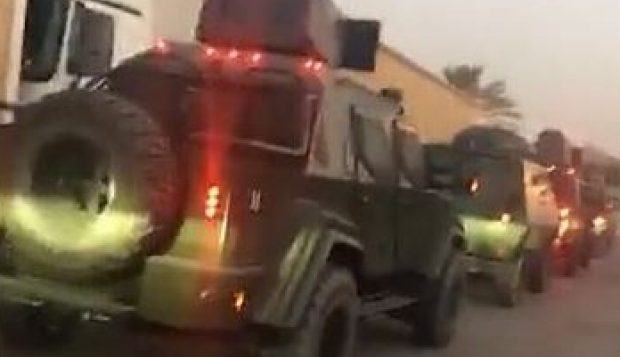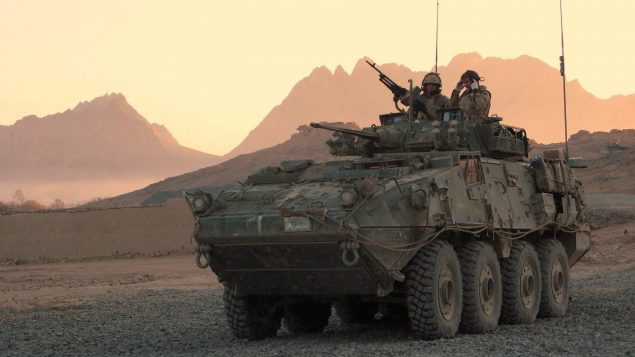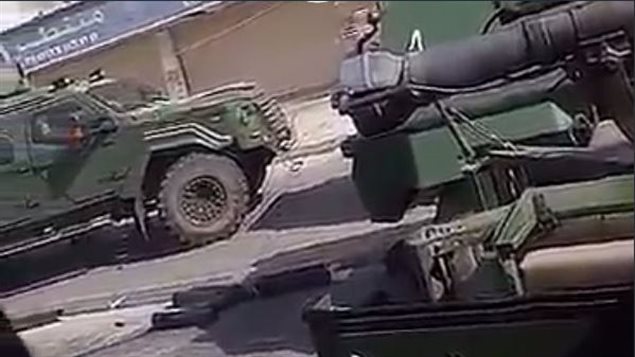The federal government has found no “conclusive” evidence Canadian-made armoured vehicles were used to commit human-rights violations in Saudi Arabia’s restive Eastern Province last summer, Foreign Affairs Minister Chrystia Freeland told a parliamentary committee Thursday.
That was the result of a “full and thorough” investigation by Global Affairs officials after videos and photos surfaced last July of Saudi special police and security forces using Canadian-made armoured vehicles in a crackdown against Shia Muslim minority militants in the town of Awamiyah, Freeland said.
“That was the independent, objective opinion of our public service and the advice given to me as minister,” Freeland told MPs on the Commons foreign affairs committee.
- Ottawa scrambles to investigate reported use of Canadian arms in Saudi crackdown
- Canadian armour on display as Saudi troops celebrate victory in Shia town

A still image taken from a video posted on Twitter appears to show a Terradyne Gurkha APC on the streets of Awamiyah in the Eastern Province of Saudi Arabia. (Anthony Fenton/Twitter)
This experience did, however, cause her to pause and led her to re-examine Canada’s export permit system, Freeland said.
“Canada is not alone in the world in taking stock of how we allow and monitor the export of arms, and of the considerations that go into those decisions,” Freeland said. “I have spoken with my counterparts in Germany, Sweden and The Netherlands, for example, whose countries have all recently—in one way or another—questioned how arms are exported.”
To toughen Canada’s arms exports laws, Freeland said the Liberals plan to introduce a new clause in Bill C-47, a proposed legislation which would amend the Export and Import Permits Act to allow Canada to accede to the Arms Trade Treaty (ATT).
The Liberal government supports the inclusion of a “substantial risk” clause in the law, which would require the Global Affairs officials who issue export permits for military equipment to ensure that there was no substantial risk such equipment could be used to commit human rights violations, she said.
“Such a clause would mean that our government, and indeed future governments, would not allow the export of a controlled good if there were a substantial risk that it could be used to commit human rights violations,” Freeland said.
But there is one caveat, she said.
“As a matter of broad principle, Canada will honour, to the greatest extent possible, pre-existing contracts,” Freeland said.
Freeland said Canada’s word as a “trusted partner” in international negotiations has to be protected.

A Canadian LAV (light armoured vehicle) arrives to escort a convoy at a forward operating base near Panjwaii, Afghanistan at sunrise on Nov.26, 2006. (Bill Graveland/THE CANADIAN PRESS)
This would mean that the $15-billion deal brokered by Ottawa to sell advanced Light Armoured Vehicles (LAV 6.0) to Saudi Arabia would still go ahead.
That’s a very troubling development, said Cesar Jaramillo, executive director of Project Ploughshares, a disarmament group.
“The main reason why it’s troubling has to do with the very standard that the government is using,” Jaramillo said in a phone interview from Waterloo, Ontario.
“They keep referring – and this is a recurring problem – to evidence,” Jaramillo said. “But this emphasis on the word evidence is misleading because from an arms-control perspective internationally the gold standard, the recognized threshold that should guide decisions is not evidence but reasonable risk.”
(click to listen to the full interview with Cesar Jaramillo)
ListenThe restrictions on arms exports called for under the ATT are based on a risk assessment, not evidence, which could be hard to get, Jaramillo said.
“We feel that the government uses the wrong standard,” he said.
Jaramillo nevertheless welcomed the announced substantial risk clause in Bill C-47.
“The devil will be in the details of the specific wording, but it seems there is appetite from Global Affairs Canada to take into account some of the concerns and recommendations that various civil society actors have made to the government related to Bill C-47,” Jaramillo said. “The inclusion of this risk clause makes it very explicit that unless the risk can be mitigated or avoided, then the export will simply not proceed.”







For reasons beyond our control, and for an undetermined period of time, our comment section is now closed. However, our social networks remain open to your contributions.